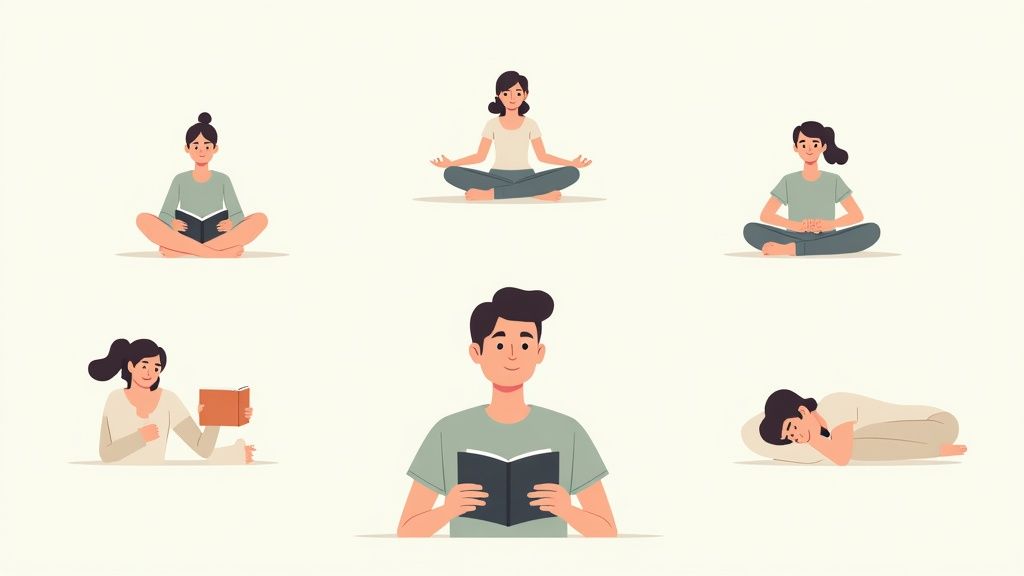Advertisement
Lifestyle
Get the most restful sleep possible for your safety and health

Get your best sleep | Safety+Health
Understanding the Importance of Sleep
Sleep isn’t just about closing your eyes and dreaming pleasant dreams. It’s a critical aspect of our overall health and functioning. It affects how we think, feel, and perform our daily tasks. Inadequate or poor-quality sleep can lead to mood disorders, cognitive dysfunction, and serious health conditions.
Achieving good sleep begins with understanding its importance and acknowledging individual mental and physical needs for rest. Good sleep is attainable with the right information, tools, and mindful practices.
Fun fact: adult human beings typically require about seven to nine hours of sleep per night. How well are you reaching that goal? If you’re coming up short, consider the approaches we’ll discuss in this blog.
An average person who lived until 75 years old would have spent approximately 25 years asleep, that’s how important good-sleep is to humans!
- We spend around one-third of our lives sleeping.
- Sleep helps in maintaining a healthy immune system.
- It aids in memory retention and learning capabilities.
- Quality sleep enhances creativity and productivity.
- Lack of sleep could contribute to weight gain.
- Poor sleep has been linked to heart disease and other serious medical conditions.
The Science Behind Sleep
As we delve into the topic, it’s essential to be aware of the science behind sleep. There’s more beyond simply turning off and reigniting our consciousness every day. It involves various stages, each playing unique and relevant roles in various aspects of our health.
The principle of sleep measures on two fundamental concepts: adenosine and melatonin. Adenosine is a by-product of our body’s energy use, while melatonin prepares us for sleep. A beautiful dance between these two leads us into the world of dreams.
So then, how can one get the best sleep? Let’s venture into the subsequent discussions and find out.
Once, Harvard researchers conducted a 3D time-lapse imaging study of fruit flies. They found that during sleep, synapses in neuronal networks shrink by nearly 20 percent allowing these networks to recover from daily activities!
- During sleep, our bodies repair damaged cells.
- Sleeping helps restore energy used during the day.
- Sleep stages support different aspects of memory and learning.
- A lack of REM sleep affects mood and cognitive performance.
- Sleep regulates numerous metabolic processes.
- Dreams occur during REM sleep and are thought to consolidate memories and emotions.
Nutrition for Better Sleep
Eating well-balanced meals, not too close to bedtime, plays a vital role in achieving quality sleep. Specific foods promote better sleep due to their content. Foods rich in magnesium, calcium, and vitamin B6 aid the production of melatonin, the “sleep hormone.”
You want to build your diet around foods that support healthy sleep patterns. What you eat before bed can have a huge impact on your quality of sleep. Be deliberate about dinner choices, especially if you’re a late-night eater.
Take this: A person who consumes food rich in L-tryptophan (found in turkey and nuts) would naturally stimulate melatonin production helping them fall asleep quicker.
- Turkey, tuna, and nuts are sources of L-tryptophan.
- Cherries are naturally high in melatonin.
- Milk contains tryptophan and calcium, which aid in melatonin production.
- Certain types of tea, such as chamomile or passionflower tea, help induce sleep.
- Carbohydrates can make tryptophan more available to the brain.
- Almonds and walnuts also boost melatonin levels.
The Bottomline
If you’re struggling with sleep, take some time to examine what might be the potential cause. It could be due to stress, diet, or lifestyle habits that hinder good sleep. Begin by focusing on creating an environment conducive to rest, finding a routine that works for you, and maintaining a balanced diet. Remember, seeking professional help is always an option if sleep issues persist.
Remember those days when we pulled an all-nighter for exams or projects? We did get our work done (let’s not talk about the quality), but how wrecked did we feel in the morning!
- Maintaining consistent sleep and wake times aids quality sleep.
- Avoiding screens before bed can improve sleep quality.
- Physical activity contributes to better sleep.
- A relaxing pre-sleep routine will help ease your mind into a restful night.
- Limiting caffeine and alcohol intake can prevent interrupted sleep.
- If sleep problems persist, it may be beneficial to consult a healthcare provider.
Summary Table
Here’s an overview of what we’ve touched upon:
| Sleep Aspect | Importance | Solution |
|---|---|---|
| Nutrition For Bed-time Snacks | Eases the transition into sleep | Eat foods rich in magnesium, calcium, vitamin B6. |
| Essential Sleep Components | Boost mental and physical health | Aim for 7 to 9 hours of sleep each night |
| Sleep Disorders | Interrupts daily life & can lead to more serious issues if not treated. | Seek professional guidance if signs persist. |
Remember, your quest for better sleep is a journey. It may take time to adjust to changes, but these tweaks and techniques are backed by science and are worth exploring. So curl up, plug in some good sounds, and drift off to a good night’s sleep! You deserve it. The world of dreams awaits you.












